Have you been extra stressed out recently due to the pandemic? Do you feel that your stress levels have negatively impacted your life and have contributed to you feeling burned out? You’re not alone! You may be dealing with something commonly referred to as Adrenal Fatigue. This blog will outline what exactly adrenal fatigue is, and give you some support for adrenal fatigue recovery.
Like many people nowadays you might be facing financial insecurities, unsure how to handle childcare or homeschooling, worrying about online classes, or just generally worrying about the future. All of these things are considered stressors.

Life sometimes hits us in a way that creates a cycle of constant stress. Many people have been under an unprecedented amount of stress due to the pandemic. And you are probably aware of how badly stress can make your body feel!
The human body has a hardwired response to stress, which enables us to focus and activate a response in the face of danger. However, the stress we face most days isn’t a matter of life or death… We can have emotional, perceived stress, physical stress from injuries, or chemical stress from smoke or pollutants. The human body reacts the same way to these types of stressors as it does to life-threatening situations.
When stress becomes chronic, the body’s adaptive response to danger becomes dysfunctional and ends up hurting our health in the long run. One of the results of this chronic stress is something called adrenal dysfunction often referred to as adrenal fatigue.
What is adrenal fatigue?
Adrenal fatigue is the end result of the constant cycle of stress. When people say adrenal fatigue, they probably mean adrenal dysfunction or HPA axis dysfunction. If left untreated, adrenal fatigue is often the end result of chronic adrenal dysfunction caused by chronic stress.
The adrenal glands produce multiple hormones, most notably cortisol and epinephrine (aka adrenaline). These hormones are the ones that help us react to stressful situations. When the brain registers a stressor, a specific cascade of hormones are produced, eventually resulting in the release of adrenaline and cortisol from the adrenal glands.
However, if the brain is constantly triggering the stress response, eventually the adrenal glands will not be able to keep up with the demands to produce these stress hormones. This is where adrenal fatigue sets in, and your entire body faces the consequences. This can happen quickly, or over the span of decades – it is all dependent on the individual!
Why should I care about cortisol for adrenal fatigue recovery?
Cortisol is a catabolic hormone, meaning that it helps to break things down within the body. This probably doesn’t really sound very good to you, and you would be correct – in chronically high levels, cortisol can do some serious damage.
Excess cortisol:
- Suppresses immune function
- Breaks down the gut mucosal barrier
- Increases insulin resistance
- Fat gain, especially around the abdomen
- Inhibits the production of testosterone, estrogen, progesterone, DHEA, and more
- Increases sodium retention and causes high blood pressure
- Reduces levels of magnesium and zinc in the body
- Alters thyroid function
- Stimulates bone loss, contributing to osteoporosis
In addition, the downstream consequences of adrenal dysfunction can lead to the erosion or break down of the gut lining, which contributes to poor gut functioning.
Another problem that occurs is that when cortisol is being produced in excess, a very important hormone called DHEA (dehydroepiandrosterone gets produced in lower amounts than usual. Cortisol and DHEA have the same precursor hormone, called pregnenolone. When the demand to produce cortisol is consistently high over a long period of time, one of the results is that there is much less DHEA production.
What is DHEA?
DHEA is essentially the opposite of cortisol – it is an anabolic hormone, which does jobs that involve building materials and structures within the body.
Some benefits of DHEA include:
- Opposes the negative effects of cortisol on the immune system
- Improves muscle mass and decreases body fat
- Precursor to testosterone
- Supports recovery from stress
- Lowers total blood cholesterol and LDL cholesterol
- Involved in conversion of thyroid hormone to the active form
- Stimulates building bones to prevent osteoporosis
You should notice that DHEA generally opposes the effects of cortisol.
So, in addition to all of the negative effects cortisol is having on your body, excess cortisol also reduces the positive effects of DHEA by limiting its production.
The relative amounts of these two hormones are important in determining which stage of adrenal fatigue you are in. Knowing which stage you are in helps your functional medicine dietitian determine what kind of treatment is required to get you back to optimal health. In other words, knowing which stage you are in sets the stage for adrenal fatigue recovery.
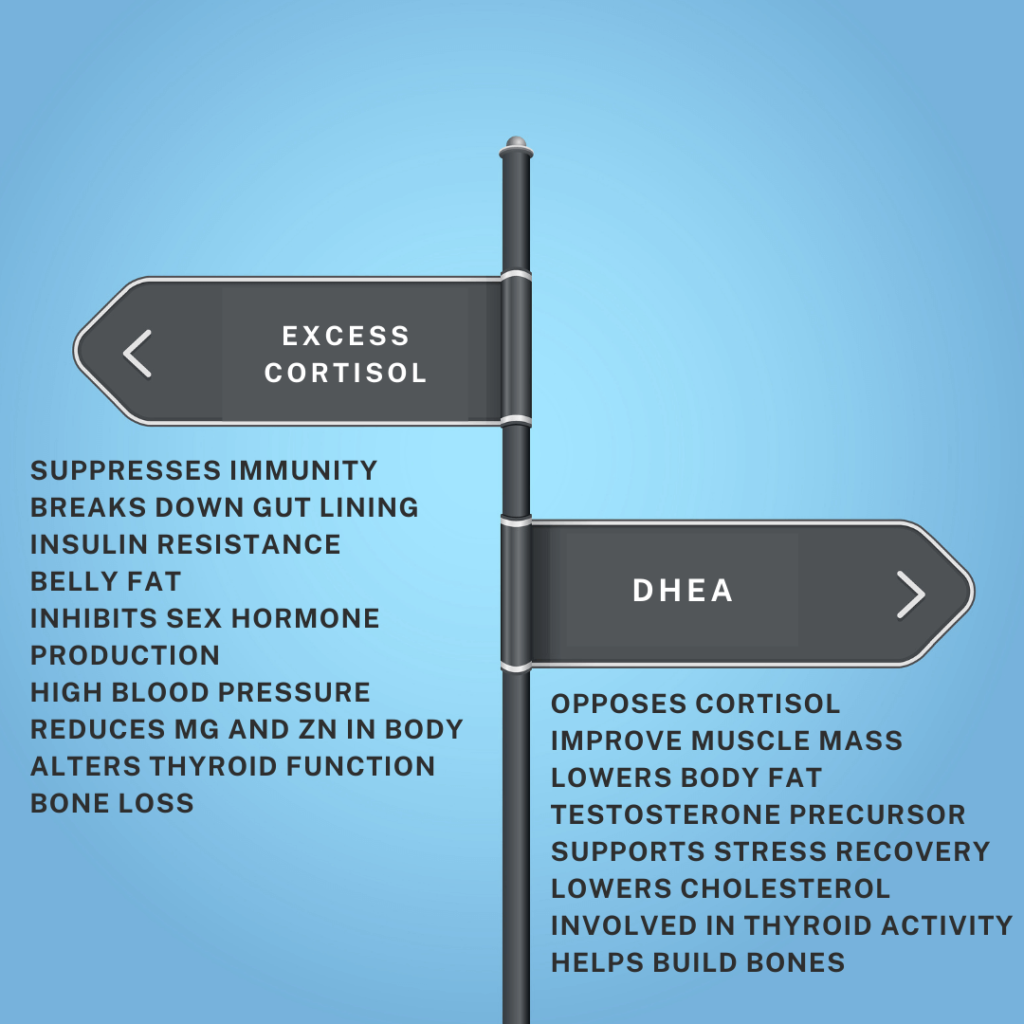
There are 3 stages of HPA Axis Dysfunction / Adrenal dysfunction
A skilled practitioner is able to determine which stage of adrenal dysfunction you are in by looking at your adrenal hormone test results.
- In stage 1 of adrenal dysfunction, your body is in a permanent alarm phase and is producing extremely high levels of cortisol, and DHEA levels are dropping.
- During stage 2 of adrenal dysfunction, cortisol levels may seem normal, but DHEA levels are low.
- In stage 3, the body is producing very low amounts of cortisol and DHEA. This is the result of the system crashing completely. If this stage is reached, you will need more than just a lifestyle overhaul to address the issue. This is the stage that we consider true adrenal burn-out.
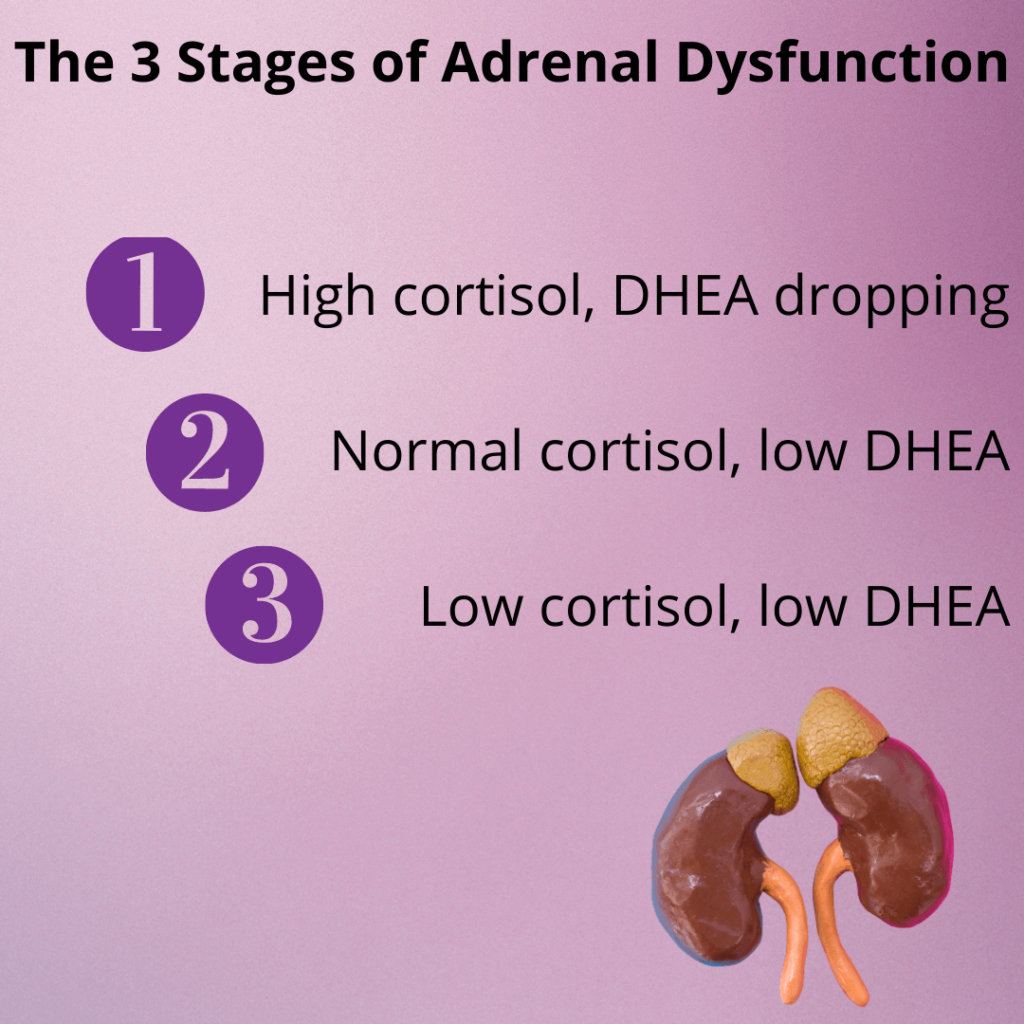
Possible signs and symptoms of chronic stress, HPA axis dysfunction, and adrenal burn-out:
- Fatigue
- Feeling tired but also wired
- Sugar and simple carbohydrate cravings
- Insomnia
- Increased belly fat
- Low energy and poor recovery from exercise
- Poor immune function
- Anxiety
- Memory problems
- Depression
- Nutrient deficiencies
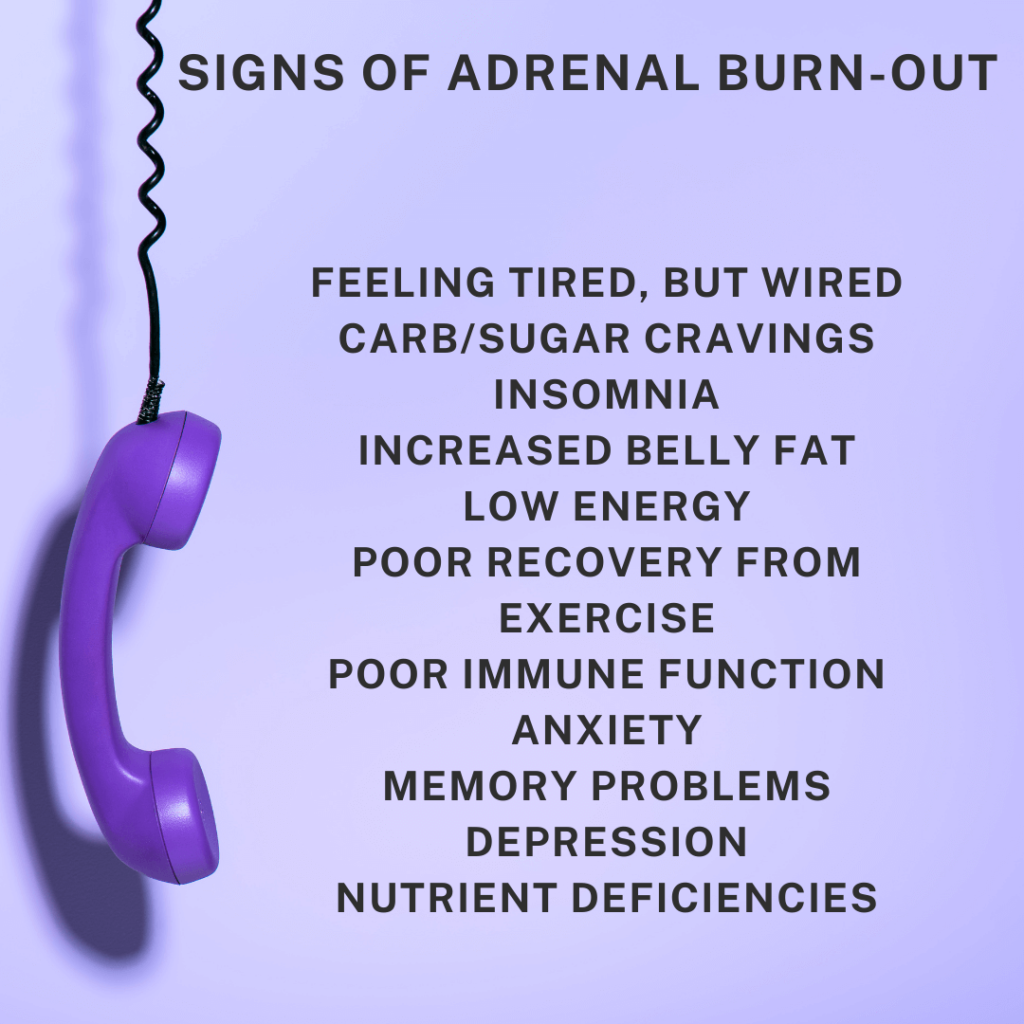
Chronic conditions that can be affected by a hyperactive stress response:
- Diabetes
- High blood pressure (hypertension)
- Cardiovascular Disease
- Autoimmune illnesses
- Chronic fatigue syndrome
- Osteoporosis
- Infertility
- Digestive conditions (SIBO, IBS, IBD, etc.)
How to know if you are suffering from adrenal dysfunction
If you are dealing with any of the symptoms or conditions listed above, you might be suspecting that you are in one of the stages of adrenal dysfunction. The only way to truly determine if this is true is to have your adrenal hormone levels tested with a saliva test. Salivary cortisol is used because it is the most convenient way to measure cortisol.
These adrenal hormone tests are noninvasive and easy to do in the comfort of your own home. Saliva testing involves spitting into a tube at specific intervals throughout the day. These saliva samples are then graphed and compared to the range of normal cortisol levels.
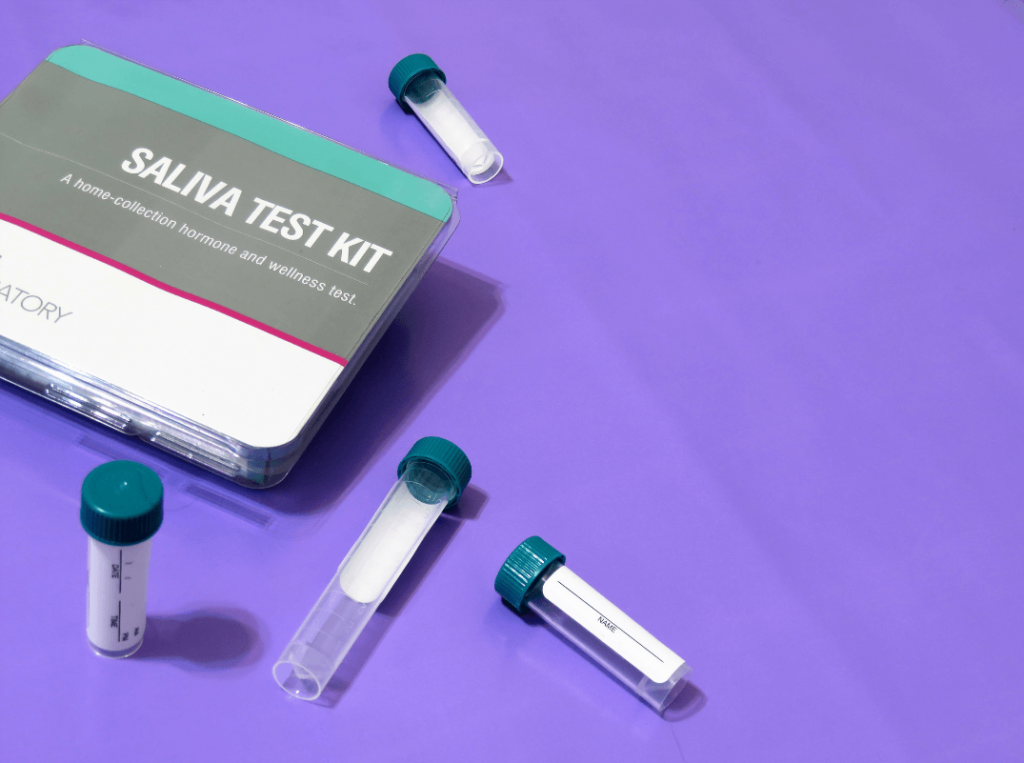
The adrenals produce cortisol in what is called the circadian rhythm. This means that naturally, cortisol is produced throughout the day in a typical, distinct pattern.
Comparing your cortisol values to the standard circadian rhythm allows your functional medicine dietitian to determine whether or not you’re in adrenal dysfunction, and if so, which stage you are in. This information is usually enough for your practitioner to give you a treatment protocol that will help you get back into the normal range. Sometimes, other testing may be required in your personal adrenal fatigue recovery journey.
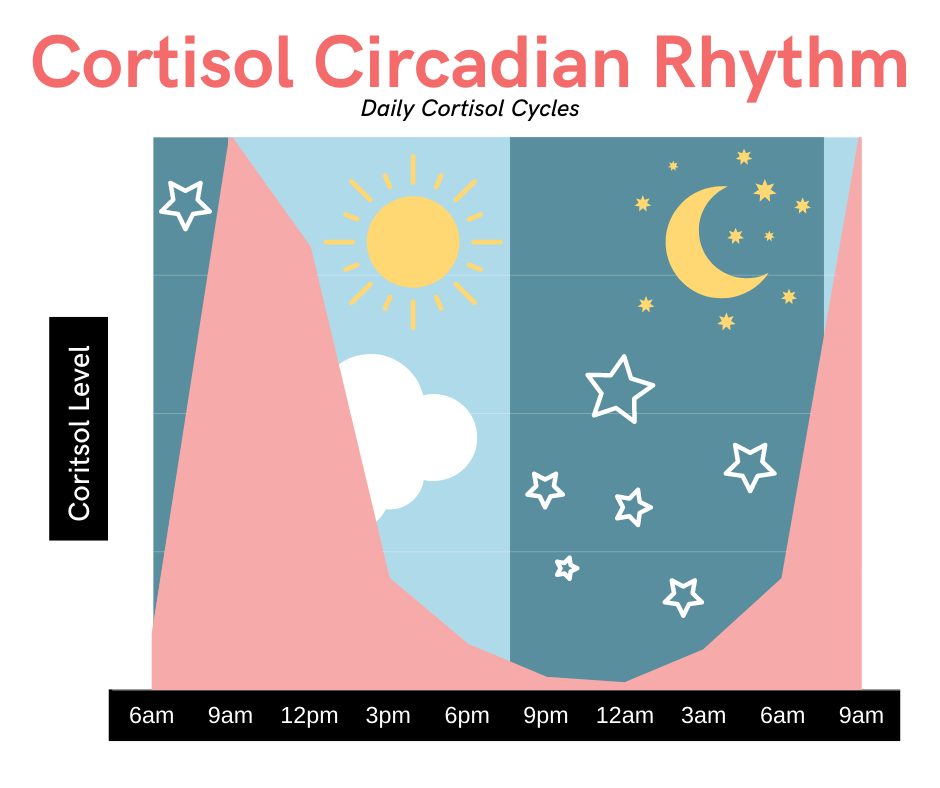
So how exactly do we begin our journey to adrenal fatigue recovery?
Healing Adrenal Fatigue
The first step to improving your adrenal function is to test your adrenal hormone levels to be sure that you have adrenal dysfunction or insufficiency in the first place, and if you do have it, knowing which stage you are in. Depending on which stage you are in, there are different protocols.
Improve your stress resilience…
Remember that the stress response actually starts in the brain. How you perceive an event is actually more important than the event itself. This is why two different people who experience the same event may have drastically different emotional and psychological responses.
One person may get a parking ticket and think “UGH… this always happens to me! Why am I so unlucky?” and then they ruminate over the ticket all day. The other person who got a parking ticket may brush it off, consider it not a big deal, and not even think about it again. These two people experienced the same event, but only one of them triggered their stress response – and that person triggered it continuously throughout the day!
So, the first thing you can do to improve adrenal function is to dedicate some time to cultivating a more positive mindset and to make an effort to learn how to remain calm in the face of a potential stressor. Reminding yourself of things you are grateful for can help you in working towards a less reactionary approach to stress.
There are many relaxation techniques that you can practice that will help you gain more resilience in the face of stress. These relaxation techniques include: breathing exercises, mindfulness, meditation, vagus nerve activation, yoga, and much more. Find what method works for you, and remember that improving your stress resilience takes time!
Clean up your diet!
Adjusting your diet is also usually necessary. Reducing the amount of added sugars and highly processed foods in your diet is a good first step towards reducing hidden inflammatory stress within the body. Be sure to stay hydrated and to fuel your body with plenty of fiber, lots of fruits and vegetables, and sufficient amounts of protein and fat.
Variety is the key in any diet to ensure you consume adequate amounts of all the necessary vitamins and minerals. Don’t take any supplements without the approval and recommendation from your dietitian. These recommendations should be based on your lab results, because toxicity is always possible, which can do even more damage to your already stressed out body.
Get plenty of sleep!
Since cortisol is linked to our sleep-wake cycles, quality sleep is key to improving health outcomes. Blue light glasses are useful while looking at screens throughout the day and in the hours before bedtime to block the blue light emitted from the screens of our electronics.
Blue light exposure close to bedtime tricks the brain into thinking daylight is still present, and alters the circadian rhythm. Of course, it is much better to avoid this blue light exposure right before you sleep. Getting at least 7 hours of uninterrupted sleep in a dark, cool room is essential for high sleep quality.
Get to the root cause of digestive issues
If you’re experiencing gastrointestinal distress, it is possible that additional functional medicine testing is needed to determine the next steps. Any symptoms you have may be connected to the HPA axis dysfunction, so communicating with your functional medicine dietitian is extremely important. Chronic stress is linked to digestive issues such as microbiome imbalances (dysbiosis), small intestine bacterial overgrowth (SIBO), constipation, diarrhea, and much more.
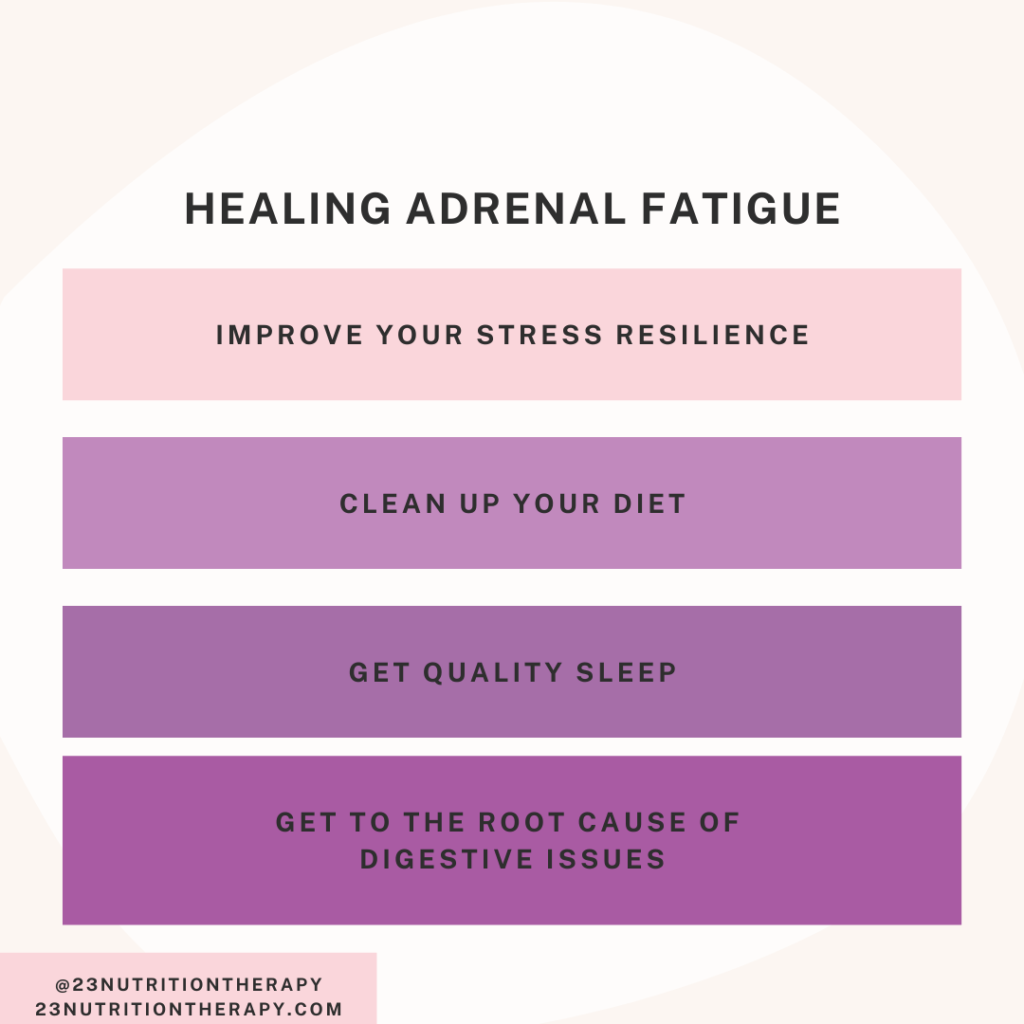
When one system in the body goes awry, many others may follow. Catching adrenal dysfunction before it gets to stage 3 is ideal. However, there are treatment options if you do find yourself in stage 3.
Following the guidance your functional medicine dietitian sets out for you can improve so much more than just the adrenal fatigue alone.
Improving your quality of life starts with simply knowing where to begin!
Have you been feeling burned out? Do you want to get to the bottom of what is causing your symptoms? Schedule your appointment today to get started on your journey to adrenal fatigue recovery!
Sign up for the Adrenal Reboot program for individualized support for your adrenal fatigue recovery




